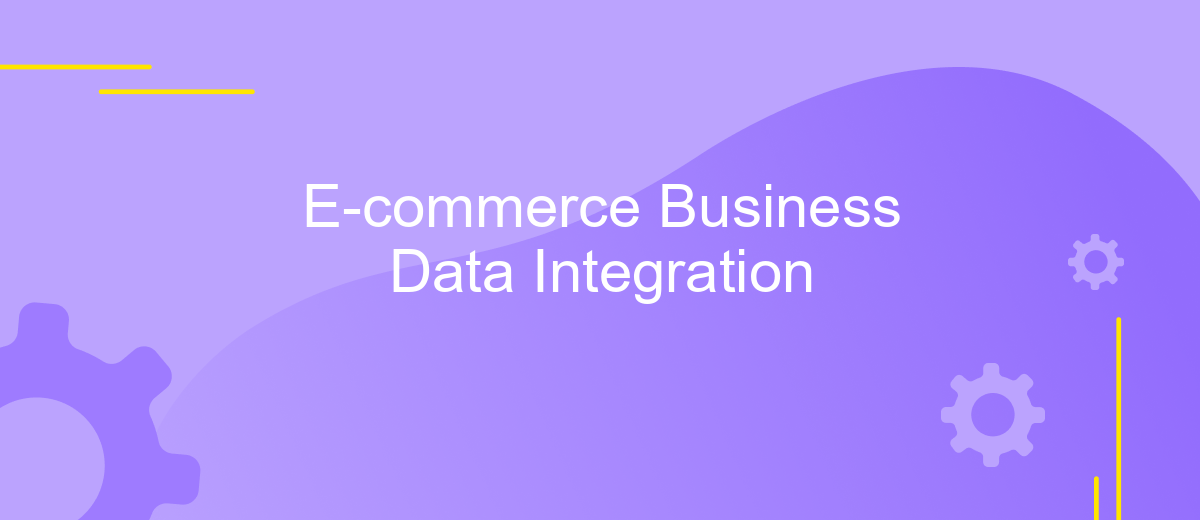E-commerce Business Data Integration
In today's rapidly evolving digital landscape, e-commerce businesses must efficiently manage and integrate vast amounts of data to stay competitive. Data integration streamlines operations, enhances customer experiences, and drives informed decision-making. This article explores the critical role of data integration in e-commerce, highlighting key strategies and tools that can help businesses harness the full potential of their data.
Introduction
The rapid evolution of e-commerce has revolutionized the way businesses operate, necessitating robust data integration solutions. Efficient data integration is crucial for streamlining operations, enhancing customer experiences, and driving growth. By consolidating data from various sources, businesses can gain valuable insights and make informed decisions, ultimately leading to increased competitiveness in the digital marketplace.
- Improved operational efficiency
- Enhanced customer experience
- Data-driven decision making
- Increased competitiveness
As the e-commerce landscape continues to expand, the need for seamless data integration becomes more pressing. Companies must adopt advanced technologies and strategies to ensure their data is accurate, accessible, and actionable. This integration not only supports real-time analytics but also fosters innovation and agility, enabling businesses to stay ahead in a rapidly changing environment.
Types of E-commerce Data

E-commerce data can be broadly categorized into several types, each playing a critical role in the smooth operation and growth of online businesses. Transaction data includes details about sales, payments, refunds, and customer interactions, providing insights into consumer behavior and financial performance. Product data encompasses information about the items being sold, such as descriptions, prices, stock levels, and categories, essential for inventory management and marketing strategies. Customer data, which includes personal details, purchase history, and preferences, helps businesses personalize their offerings and improve customer service.
Another important type of e-commerce data is website data, which covers metrics like traffic, user behavior, and conversion rates, crucial for optimizing the user experience and increasing sales. Integrating these diverse data types can be challenging, but tools like ApiX-Drive simplify the process by connecting various data sources and automating data flows. This integration ensures that businesses can efficiently manage and analyze their data, leading to more informed decisions and better overall performance.
Data Integration Challenges

Integrating data in e-commerce businesses presents several challenges that can impact efficiency and decision-making. These challenges stem from the complexity and diversity of data sources, as well as the need for seamless integration to ensure accurate and timely information flow.
- Data Silos: Different departments often use various systems, leading to isolated data that is difficult to consolidate.
- Data Quality: Inconsistent, incomplete, or inaccurate data can lead to poor business decisions and customer dissatisfaction.
- Scalability: As the business grows, the integration system must handle increasing volumes of data without performance degradation.
- Real-time Integration: Ensuring that data is updated and synchronized in real-time across all platforms is a significant technical challenge.
- Security and Compliance: Protecting sensitive customer data and adhering to regulatory requirements adds another layer of complexity.
Addressing these challenges requires a strategic approach, leveraging advanced integration tools and technologies. Businesses must focus on creating a robust data management framework that ensures data accuracy, security, and accessibility across all e-commerce platforms.
Data Integration Solutions

Data integration is a crucial component for the success of any e-commerce business. It involves combining data from various sources into a unified view, enabling businesses to make informed decisions. Effective data integration solutions help streamline operations, improve customer experiences, and drive growth.
Several solutions are available for integrating data in e-commerce environments. Choosing the right one depends on the specific needs and infrastructure of your business. Here are some popular options:
- ETL Tools: Extract, Transform, Load (ETL) tools are designed to pull data from different sources, transform it into a usable format, and load it into a data warehouse.
- API Integrations: APIs allow different software applications to communicate with each other, facilitating real-time data exchange and synchronization.
- Data Warehousing: Centralized repositories that store integrated data from multiple sources, enabling advanced analytics and reporting.
- iPaaS: Integration Platform as a Service (iPaaS) offers cloud-based solutions that integrate applications and data across different environments.
Implementing the right data integration solution can significantly enhance the efficiency of your e-commerce operations. It ensures that all your business systems are interconnected, providing a seamless flow of information and enabling better decision-making.
- Automate the work of an online store or landing
- Empower through integration
- Don't spend money on programmers and integrators
- Save time by automating routine tasks
Benefits of Data Integration
Data integration in e-commerce businesses offers numerous benefits that can significantly enhance operational efficiency and decision-making processes. By consolidating data from various sources, businesses can gain a comprehensive view of their operations, customer behavior, and market trends. This holistic perspective allows for more accurate forecasting, personalized marketing strategies, and improved inventory management. Furthermore, integrated data systems reduce the chances of errors and inconsistencies, ensuring that all departments are working with the same information, which ultimately leads to better coordination and streamlined workflows.
Implementing data integration can be simplified with the use of specialized services like ApiX-Drive. ApiX-Drive enables seamless data synchronization between different platforms without the need for extensive coding knowledge. It supports a wide range of applications and systems, making it easier for businesses to automate data flows and maintain up-to-date information across all channels. By leveraging such tools, e-commerce businesses can save time, reduce operational costs, and focus more on strategic initiatives rather than getting bogged down by manual data management tasks.
FAQ
What is E-commerce Business Data Integration?
Why is data integration important for e-commerce businesses?
How can I automate data integration for my e-commerce business?
What are the challenges of e-commerce data integration?
How can ApiX-Drive help with e-commerce data integration?
Apix-Drive is a simple and efficient system connector that will help you automate routine tasks and optimize business processes. You can save time and money, direct these resources to more important purposes. Test ApiX-Drive and make sure that this tool will relieve your employees and after 5 minutes of settings your business will start working faster.


